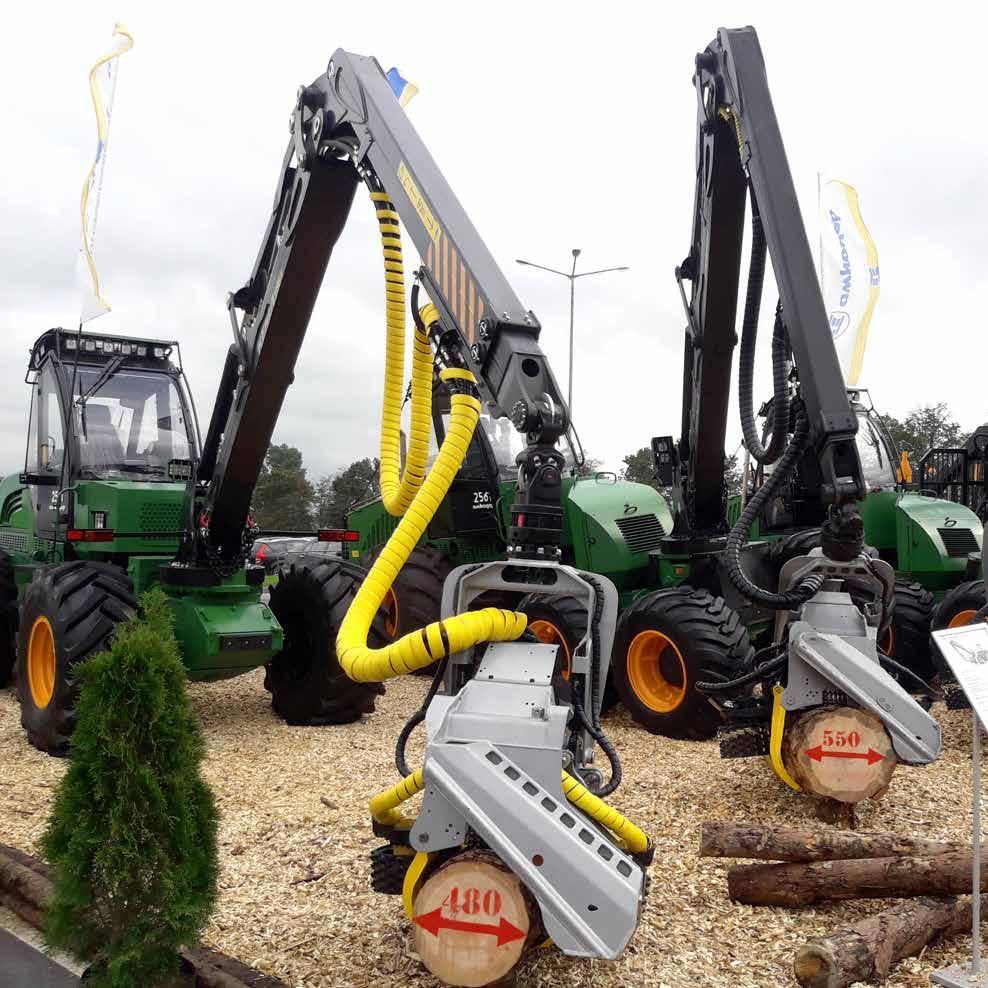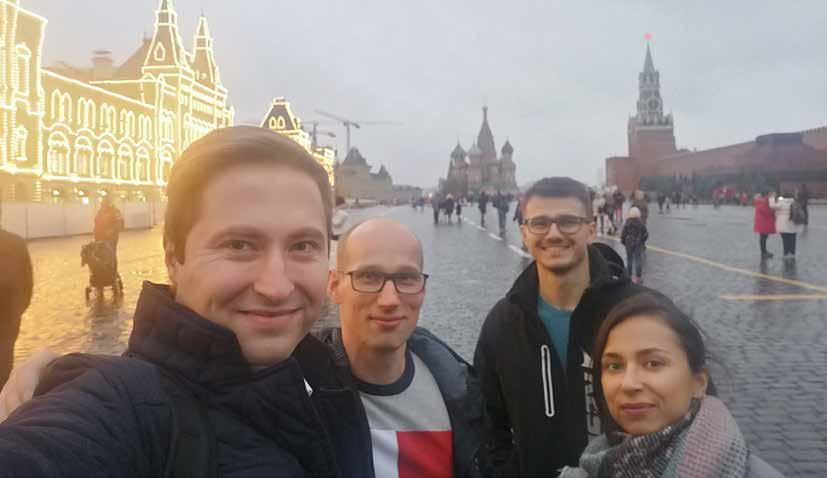
6 minute read
Heading for Belarus
Kesla has long cooperated with the Belarusian company Amkodor by supplying harvester heads and cranes, for example. Photo taken at Minsk Forestry Exhibition.
Kesla was among the first Finnish companies that realised the market potential of Belarus in the mid-2000s. The first forestry crane was delivered to the Minsk tractor factory in 2005 and the first harvester head and harvester crane to Prommedinvest in 2006.
Amkodor’s strategic partner
At the end of October 2019, Kesla Regional Manager Veli Käyhkö was preparing a training trip to Amkodor. Approximately 20 Amkodor service representatives were coming to the training seminar. Käyhkö and his colleague, Regional Manager Artur Ihno, compiled material related to Kesla’s products in close cooperation with Amkodor’s own technical team.
"Half theory, half practice: simulation training, and forwarder and harvester practice and measurements. Kesla is Amkodor’s strategic partner, and systematic training cooperation also speaks to that," says Veli Käyhkö.
Strong consulting
When Veli Käyhkö started his work as Kesla’s Service Manager in 2006, he was also urgently needed in the Belarusian market.
Kesla Sales department, with Tarja Tykkyläinen as an interpreter, played a big role when partners and customers were guided and advised on various issues in the right direction – not everything had to be learned the hard way. At that time, Belarus had a strong government-led motivation and plan to mechanise timber harvesting. The same level of planning is still evident in the country’s forestry sector. The goals listed individually in the Belarusian Forest Programme 2016–2020 included technical modernisation of forestry, more efficient use of forest resources as well as modernisation of timber harvesting and wood processing industry.
Importance of cooperation
In the early years of cooperation, bureaucracy related to the movement of both goods and people also presented challenges. There was no chance of visa exemption, and the paperwork involved in travel took a long time at the airport. The transport of various promotional materials, electronics and components was also problematic. “It’s been a big change. Today, mobility and interaction are smoother.”
Veli Käyhkö says the Belarusians are quick learners. Instead of the basics of mechanics, electrical engineering and hydraulics, these days the partners discuss new product ideas and innovations as well as product improvement proposals. Amkodor was founded in 1927 as a working community that made children’s toys. In 1952, the company started manufacturing road construction machines. The first harvester chains were manufactured by the company in 2006. The Amkodor Group was formed in 2012, and its forwarder was named the product of the year in Belarus. Amkodor is a significant OEM customer for Kesla. Most of Amkodor’s machines stay on the Belarusian domestic market. One of the main export countries is Russia, and Amkodor’s forest machines are also sold in the EU.
Monoglot beginnings
Veli Käyhkö had to learn a lot of new things while doing business in Belarus.
Today, Käyhkö can communicate partly in Russian. His spoken language skills still need a lot of work, but his reading is coming along. His studies continue, although travelling and time differences make it difficult. Since autumn 2019, Veli Käyhkö has also been responsible for Kesla’s marketing and operations in the Quebec region in Canada.

Andrei Sirotenko (left) from EM-System (representative of the Amkodor importer). Veli Käyhkö (back row), Artur Ihno and Aleksandra Ihno from Kesla.
Bread, vodka and cows
“At the time, I was the only Russian speaker in Kesla’s sales department, so I got to join the trip as an interpreter,” says Export Assistant Tarja Tykkyläinen. The first contact with Amkodor took place at the Elmia Fair in 2005, where Amkodor’s representatives were mapping out potential partners. Subsequently, Amkodor faxed Kesla product enquiries. Mikko Lehikoinen, Kesla’s marketing manager at the time, and Tykkyläinen set out to see what kind of company Amkodor was and whether the enquiries were serious. “I was very impressed with Minsk, everything there was very big. From the first visit, I especially remember the trip to the forest. We went to a grocery shop with our hosts, and they bought bread and vodka for lunch. Then we drove somewhere, stopped by a pasture and had our lunch,” recalls Tarja Tykkyläinen, whose career in Kesla started in 1996. They did not talk business there on the edge of the pasture, but rather got to know each other – without pretence, with an audience of cows, and enjoying the genuine country atmosphere. Personal chemistry hit it off, and trade with the Belarusians started quite quickly.

Amkodor personnel and Kesla’s Artur Ihno, Tarja Tykkyläinen and Veli Käyhkö
Luke researcher Sari Karvinen:
Russia wants to promote Scandinavian forest management model
In August 2006, Kesla established its own export company OOO Kesla in Russia. As early as 2009, Kesla announced the winding down of the subsidiary’s operational activities. It was already known in advance that the establishment and start-up of a subsidiary in Russia would be a challenging and time-consuming operation. After the wind-down, Kesla continued sales in Russia through local dealers and partners. The steering and support functions were carried out from Finland.
Luke researcher Sari Karvinen, who has been studying Russian forestry for 15 years, estimates that there has been a significant change in Russian forestry over the past couple of years. The debate on improving the efficiency of forestry, which began as early as the 1960s, has finally materialised in a reform of the rules on forest use. Russia wants to promote the transition to the Scandinavian forest management model and to increase the amount of improvement cutting. Russia’s political will appears to be a great opportunity for Finnish forest machine technology. The annual logging volumes of the country of massive forest resources are telling. While in 2008 the logging volume in Russia was about 180 million m 3 , in 2014 the volume had already risen to 203 million m 3 . In 2018, 239 million m 3 of wood were felled in Russia. At the moment, only 5% of the wood comes from improvement cutting.
In autumn 2018, Amkodor announced its intention to start the production of accessories and components for forest machines in Petrozavodsk. Amkodor had acquired the Onega tractor factory, which used to be Petrozavodsk’s most important industrial plant before its bankruptcy. Amkodor reportedly had plans to settle in Yekaterinburg on the Urals, but Petrozavodsk eventually drew the long straw. The city’s strengths are a university with a focus on forest technology and good logistic connections.
On 17 September 2018, Natural Resources Institute Finland (Luke) released the news: “Amkodor announces the establishment of the Amkodor-Onego company in Karelia, within the framework of which it will start the production of accessories and components for forest machines, such as booms and cutting equipment. This can reduce dependence on foreign suppliers and increase the share of local production. The production volume of forest machines may rise to 1,000 units per year, which will give the company a leading position in the Russian forest machines market.
The project has the support of both regional and federal authorities. The company is eligible for benefits in terms of credits, taxation and energy tariffs, and the state may compensate for part of the purchase of machinery and the costs of construction and research. The investment is estimated at between $250 million and $300 million. ”In summer 2019, Amkodor announced that the Ministry of Industry and Trade of Russia, the Government of the Republic of Karelia and Amkodor-Onego had signed a 10-year investment agreement, which will grant tax relief to new forest machines production, among other things. Amkodor-Onego said that it would invest some€200 million in the machines production of the Onego tractor plant. The aim is to produce at least a thousand forest machines a year. Production is set to start in 2030.

Kesla’s partner Amkodor has announced plans to start a company in Karelia.










